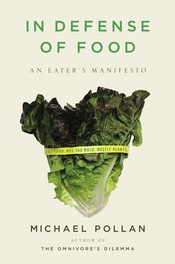Interesting
Reading for 2010
 |
Food. There's plenty of it around, and
we all love to eat it. So why should anyone need to defend it?
Because most of what we're consuming today is not food, and how
we're consuming it - in the car, in front of the TV, and
increasingly alone - is not really eating. Instead of food, we're
consuming "edible foodlike substances" - no longer the
products of nature but of food science. Many of them come packaged
with health claims that should be our first clue they are anything
but healthy. In the so-called Western diet, food has been replaced
by nutrients, and common sense by confusion. The result is what
Michael Pollan calls the American paradox: The more we worry about
nutrition, the less healthy we seem to become.
But if real food - the sort of food our great grandmothers would recognize as food
- stands in need of defense, from whom does it need defending? From the food industry on one side and nutritional science on the other. Both stand to gain much |
from widespread confusion about what to eat, a question that for most of human history people have been able to answer without expert help. Yet the professionalization of eating has failed to make Americans healthier. Thirty years of official nutritional advice has only made us sicker and fatter while ruining countless numbers of meals.
Pollan proposes a new (and very old) answer to the question of what we should eat that comes down to seven simple but liberating words:
Eat food. Not too much. Mostly plants. By urging us to once again eat food, he challenges the prevailing nutrient-by-nutrient approach
- what he calls nutritionism - and proposes an alternative way of eating that is informed by the traditions and ecology of real, well-grown, unprocessed food. Our personal health, he argues, cannot be divorced from the health of the food chains of which we are part.
In Defense of Food shows us how, despite the daunting dietary landscape Americans confront in the modern supermarket, we can escape the Western diet and, by doing so, most of the chronic diseases that diet causes. We can relearn which foods are healthy, develop simple ways to moderate our appetites, and return eating to its proper context
- out of the car and back to the table. Michael Pollan's bracing and eloquent manifesto shows us how we can start making thoughtful food choices that will enrich our lives, enlarge our sense of what it means to be healthy, and bring pleasure back to eating.
If you appreciate In Defense of Food, you might also enjoy Pollan's
best-selling 2007 book, The Omnivore's Dilemma, which launched a national conversation about the American way of
eating.
The World Health Organization rated the national health care systems of 191 countries in terms of “fairness,” the United States ranked fifty-fourth. That put us slightly ahead of Chad and Rwanda but just behind Bangladesh and the Maldives. How is it that all the other industrialized democracies provide health care for everyone at a reasonable cost, something the United States has never managed to do? In
The Healing of America, New York Times best-selling author T.R. Reid shows how they do it, bringing to bear his talent for explaining complex issues in a clear, engaging way.
In his global quest to find a possible prescription for our ailing system, Reid visits wealthy industrialized free-market democracies like our
own - including France, Germany, Japan, the UK, and Canada - where he finds inspiration in example. Reid shares evidence from doctors, government officials, health care experts, and patients the world over, finding that foreign health care systems often provide more choice and shorter waiting times than the United States. And that dreaded monster “socialized medicine” turns out to be a myth. Many developed countries provide universal coverage with private doctors, private hospitals, and private insurance
plans - insurers that accept every applicant and never deny a claim.
In addition to long-established systems, Reid also studies countries that have carried out major health care reform. The first question facing these
countries - and the United States, for that matter - is an ethical issue: Is health care a human right? Most countries have already answered with a resolute yes, leaving the United States in a murky moral backwater with nations we typically think of as far less just than our own.
The Healing of America lays bare the moral question at the heart of our troubled system, dissecting the misleading rhetoric surrounding the health care debate. Of course, every health care system has its troubles: Reid finds poorly paid doctors in Japan, endless lines in Canada, mistreated patients in Britain, Spartan facilities in France. Yet all of them cover everybody, produce better health results, and spend far less than the United States. And none leaves its citizens one diagnosis away from financial ruin. Bringing hope to one of our thorniest domestic issues, T.R. Reid uncovers the international models that could work at home as we set out to cure a health care system that has failed us.
If you appreciate The
Healing of America, you might also enjoy Reid's thought-provoking 2005 book,
The United States of Europe, although its premise and supporting
documentation are more controversial.
|
